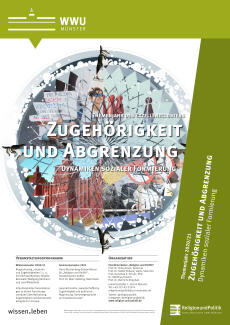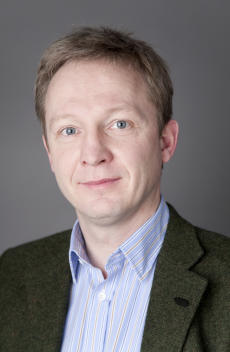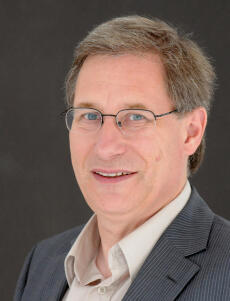“We are seeing serious conflicts across the world over belonging and demarcation”
First annual theme of the Cluster of Excellence “Religion and Politics” sheds light on the social challenges of “belonging and demarcation” – science and politics discuss dynamics and tensions between political, cultural, and religious groups – case studies from antiquity to the present – public annual programme 2020/21 comprises a wide range of event and media formats
Press release from 26 October 2020

The Cluster of Excellence “Religion and Politics” at the University of Münster will deal in its first annual theme starting in November 2020 with the social challenges of “belonging and demarcation”. Speaking at the start of the annual programme, which bears the subtitle “Dynamics of social formation” and comprises diverse event and media formats, sociologist of religion Detlef Pollack and legal historian Nils Jansen explain: “Conflicts that arise from tensions between different political, cultural and religious groups in the population, that raise questions of identity, and that are of great concern to us today, have always shaped societies – and especially so when there has been concern about immigration or foreign rule. Such challenges take on a new quality in our globally networked world, and we are seeing serious conflicts across the world”. Members of the Cluster and guests from academia and politics will use case studies from antiquity to the present day to discuss how affiliations to groups and identities arise, how they provoke conflicts, and how social equilibrium comes about. “When we deal today with religious radicalization and political polarization, or with racism and anti-Semitism, we find that these dynamics play an absolutely key role”.
As Detlef Pollack and Nils Jansen go on to explain, the rise of right-wing populist parties in Europe, the USA, and Brazil is also an example of the often emotionally charged conflicts over belonging and demarcation, with a new line of conflict having emerged “between cosmopolitanism and regionalism”. “On the one hand, there are those who are cosmopolitan, mobile, and better educated, who feel a sense of belonging to Europe, the West, the metropolises of the world; on the other are those who seek their identity in their home region, who are sceptical about multicultural ideas and diversity, and who often have a relatively low level of education”.

There are also many examples in history of the dynamics described by the annual theme, “Belonging and demarcation”, such as the history of the Jews in Ancient Rome, the multi-confessional Fatimid dynasty in the Middle Ages, and the West African soldiers deployed by the French colonial power in Europe during the world wars of the 20th century. These are examples that the lecture series “Empires, identities and belonging” will deal with. The series will open the annual programme on 3 November. Among the guests will be the political scientist Herfried Münkler and the historians Wolfgang Reinhard and Lora Wildenthal. The series will show how empires have throughout history repeatedly influenced social, cultural, and religious identities within the realm. (All interested parties should register for the zoom event at veranstaltungenEXC@uni-muenster.de by 30 October).
The annual programme continues with events on one of the major interdisciplinary research projects of the Cluster of Excellence on “Threat, belonging, and the acceptance of democracy in Europe”, and with the Hans Blumenberg Visiting Professorship, which will be held in the summer term of 2021 by the social scientist Marc Helbling from Mannheim, whose research is on integration, xenophobia, and the dynamic role of religion. In a series of talks on “Social belonging and political demarcation”, science and politics will exchange views on demarcations in the democratic system, on integration, and on populism. The annual theme, whose programme will be expanded in the course of the next 12 months, will involve scholars from sociology, law, history, and political science, as well as from psychology, philosophy, theology, and anthropology.

Fundamentalists draw on demarcation, while moderates rely on discussion
“When we talk about ‘belonging’, we mean on the one hand a fixed social category”, says the sociologist Detlef Pollack. “Whether Muslim or Christian, Turkish or North African, East German or West German, you are born into these social groups and are shaped by them from birth – whether you like it or not”. On the other, belonging is an idea that groups and their representatives create of themselves. “In this regard, social groups often have a certain image that influences their own self-image: East Germans, for example, are often ascribed a community spirit; West Germans, selfishness; Muslims, fanaticism and patriarchalism”. Regardless of their truthfulness, these ascriptions influence the self-esteem and self-perception of those affected. “If the self-perception and the external perception of a group do not coincide, then this leads to conflicts and struggles for sovereignty of interpretation. These tensions are interesting because they explain the dynamics of how social groups are formed”.
According to Detlef Pollack and Nils Jansen, a distinction can be made between communities or societies that are particularly open to their environment, and those that differentiate themselves more strongly from it. “In the religions, for example, fundamentalist groups in Christianity, Islam, Judaism, and other religious communities in the world tend to differentiate themselves comparatively strongly from their environment, a tendency that is often combined with an ambivalent relationship to themselves”. They often feel both superior and inferior to the “secular” world and other religions. “Moderate religious groups, on the other hand, rely on discussion, dialogue, and sometimes even community with those who think differently”. (sca/vvm)

